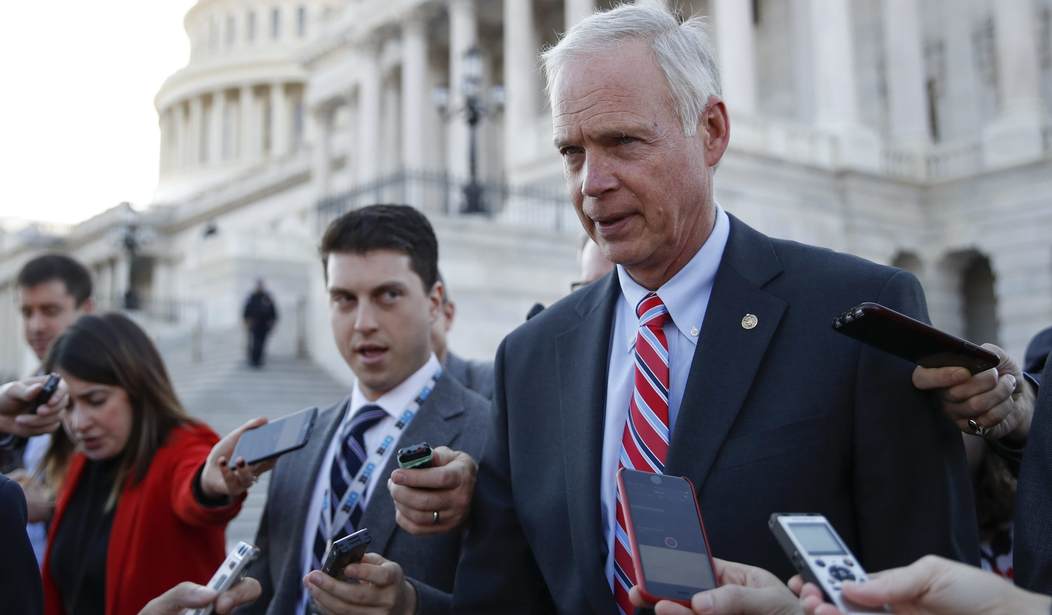WASHINGTON – Sen. Ron Johnson (R-Wis.) accused the Congressional Budget Office of throwing a “grenade” into last year’s healthcare debate during a hearing Wednesday in which Sen. Bernie Sanders (I-Vt.) demanded Republicans stop attacking the agency’s analysis.
While the Senate considered repealing certain aspects of the Affordable Care Act, the CBO released one score projecting that 15 million Americans would lose insurance coverage in 2018 under the GOP proposal. Johnson has blasted the agency for using a March 2016 baseline long before the individual markets began to collapse.
The Wisconsin Republican claims that had the CBO used a January 2017 baseline, it would have showed no change for the uninsured individual market. That would have lowered the loss to about 8 million, leaving deficits only in the Medicaid and employer markets. Johnson on Wednesday also argued that the Medicaid enrollees would not have dropped their “essentially free” coverage just because the Obamacare individual mandate had been eliminated.
“This was the grenade that CBO threw into the healthcare debate that pretty much poisoned the well,” Johnson said during a Senate Budget Committee hearing.
CBO Director Keith Hall corrected Johnson’s assertion about Medicaid, saying that the agency’s score reflected the lack of expansion for Medicaid. That 4 million-person deficit accounts for people who are not currently covered and would remain uninsured. He also added that it’s not clear that using the alternative baseline would have produced different losses in the individual market, given that altering the baseline raises premiums and lowers coverage.
“You’re not providing the American people with the information they need,” Johnson said.
Johnson lambasted Hall for not producing data on the alternative baseline in March, when 22 Republicans sent a letter to the agency requesting that the CBO, in consultation with the Joint Committee on Taxation, estimate the budgetary effects of repealing Affordable Care Act market reforms.
“I want to know — why didn’t we ever get that score?” Johnson asked. “Again, this is four months before this really came to a head. The only response we got was, ‘Eh, can’t do it.’ Now you do all kinds of different things. You make all kinds of estimates.”
“I can tell you that our health group was working flat out for months,” Hall said.
“This was in March,” Johnson responded.
“Even in March, we were working flat out for months,” Hall said.
Ranking Member Sanders in his opening remarks railed against Republicans criticizing CBO analyses on healthcare. CBO’s estimates in May showed that the American Health Care Act would have resulted in 23 million fewer people with health insurance after a decade.
“What CBO did is make the obvious conclusion that when you substantially cut federal funding on healthcare, lo and behold, people lose their health insurance,” Sanders said. “You came up with the obvious conclusion, but because you came up with that conclusion, which was not terribly palatable to some of my colleagues, you were criticized, and I think that’s unfortunate.”
Sanders also touched on CBO analysis for the tax reform legislation that recently passed. The agency projected that the bill would add $1.7 trillion to the deficit, when interest costs are included, and $1 trillion to the deficit when dynamic scoring is used.
“Day after day, month after month, I’ve heard about world collapsing when we add to the deficit of the national debt,” Sanders said. “Some of my colleagues apparently forgot about the lectures that they gave us over and over again about deficit spending.”
Sanders said he’s hopeful that his colleagues will refrain from attacking the agency because they are uncomfortable with the results the office produces.
Sen. Chris Van Hollen (D-Md.) said that sometimes lawmakers agree with the scores and sometimes not, but “my goodness, if we didn’t have some kind of referee here in the United States Congress, we would have even more of a free-for- all than we already have, and we already have a hell of a free-for-all, so I’m grateful for somebody being able to take an objective look at this and provide an analysis that we can use.”
Based on testimony, the CBO last year produced more than 700 formal cost estimates, several thousand informal cost estimates, nearly 130 appropriations scorekeeping tabulations and 86 analytical reports and working papers.









Join the conversation as a VIP Member